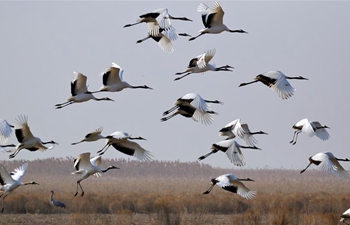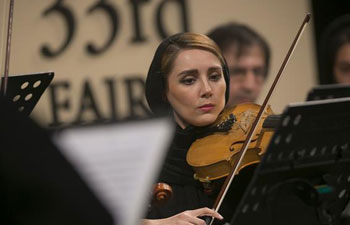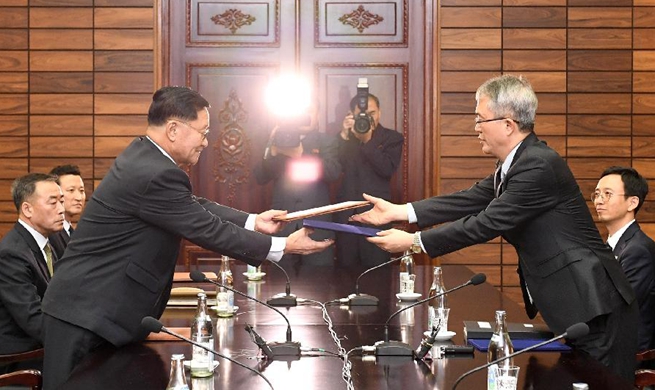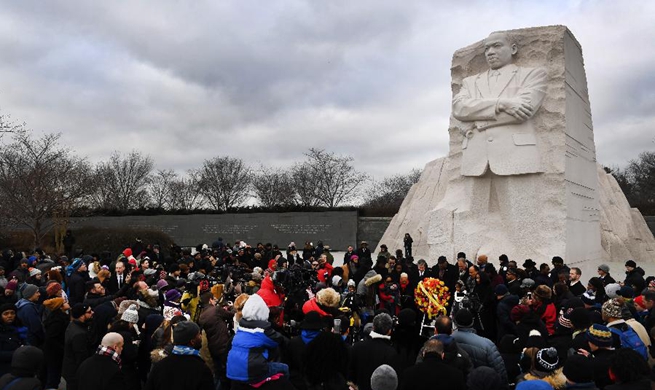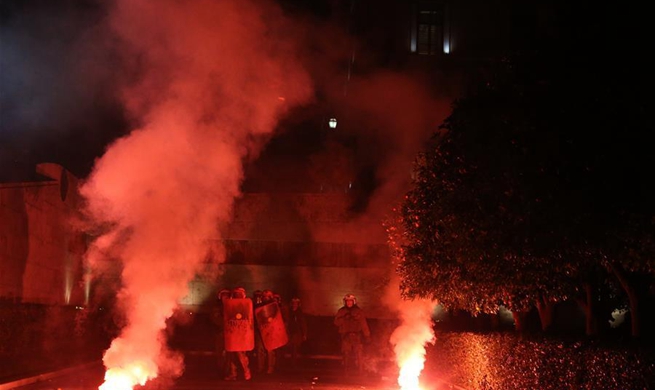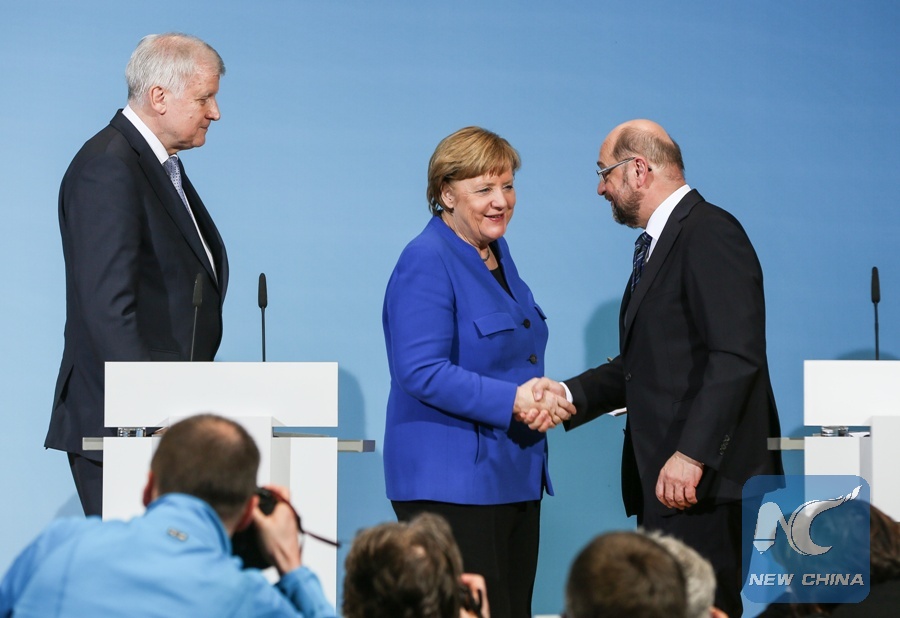
German Chancellor and leader of German Christian Democratic Union (CDU) Angela Merkel (C) shakes hands with leader of German Social Democratic Party (SPD) Martin Schulz (R) after a joint press conference at the headquarters of SPD, in Berlin, Germany, on Jan. 12, 2018. (Xinhua/Shan Yuqi)
BERLIN, Jan. 15 (Xinhua) -- Infighting amongst the German Social Democrats (SPD) following the conclusion of preliminary talks with the Christian Democratic Union (CDU) and Christian Social Union (CSU) has raised questions over the viability of another German "grand coalition" on Monday.
Both the CDU and CSU leadership have recommended finalizing negotiations over the formation of a new German government on the basis of recently-agreed and widely-publicized legislative compromises between the three prospective coalition partners.
By contrast, SPD leader Martin Schulz must still obtain an approval from his party base to join what would become Chancellor Angela Merkel's (CDU) fourth ruling cabinet at a specially-convened conference next week.
According to Kevin Kuehnert, head of the SPD youth organization, the outcome of the vote at the conference is far from clear in light of remaining resistance within the party against a re-launch of the grand coalition.
"I would not place any bets at the moment," Kuehnert told Berliner Zeitung newspaper.
The SPD youth organization leader added that beyond the party leadership, the formation of a government with the CDU and CSU was still an "extremely controversial" subject for members. Kuehnert complained that the 61-page joint policy paper produced during preliminary coalition talks lacked "an idea, a narrative."
Schulz had himself originally vowed to return his party to the opposition benches if the SPD lost federal elections back in September. Despite slumping to a historically low voter share of 20.5 percent,the SPD leader was subsequently persuaded by German President Frank-Walter Steinmeier to reverse his stance after the collapse of "Jamaica" coalition talks.
The SPD's youth organization in particular has vocally criticized this u-turn and warned that another five years as junior partner under Merkel would further diminish the party's future electoral fortunes.
Speaking to the public broadcaster SWR, Johanna Uekermann, member of the SPD leadership committee, also expressed her continued scepticism towards joining a grand coalition and argued the CDU-CSU should have offered more concessions in negotiations.
Whilst advocating for the formation of another government with the CDU and CSU in principle, several senior SPD figures called for amendments to the current joint policy proposals. SPD Vice-President Ralf Stegner told Bild newspaper that these could only form the "basis of coalition negotiations."
"People pretend as if everything has already been negotiated, but this is completely untrue," Stegner said.
Nevertheless, the CDU and CSU were unwilling on Monday to entertain the possibility of changes to the agreed legislative outline.
The compromises reached so far were "difficult for us as well, not just the SPD," CDU-CSU parliamentary faction leader Volker Kauder told the Bild. Kauder urged the SPD not to backtrack on proposals which had already been publicly-presented as reflecting a cross-party consensus and to instead focus on communicating its significant achievements during the recently-concluded talks.
CSU leader Horst Seehofer said he could "not imagine" there would be any "substantial changes" to the outcome of preliminary coalition negotiations. Seehofer's view was echoed by CSU secretary general Andreas Scheuer who emphasized that his party was "loyal to the contract" which already existed.
SPD parliamentary faction leader Andrea Nahles joined senior CDU and CSU figures on Monday in attacking members of her party who continued to resist a grand coalition. Accusing critics of purposefully talking down the deal reached between the SPD, CDU and CSU on Deutschlandfunk radio, Nahles expressed confidence that a majority of party members would ultimately vote in favor of joining a new government cabinet.
"Given that we received 20.5 percent of the vote, we negotiated very successfully," Nahles argued.
According to Nahles, those who voiced opposition to a grand coalition would have done so regardless of the concrete result of preliminary talks. Schulz and Nahles will address the influential SPD party base in North-Rhine Westphalia on Monday night in a bid to win their crucial support to conclude coalition negotiations.
In the meantime, a poll published on Monday by public broadcaster RTL found that a majority (56 percent) of SPD members are in favor of re-launching the grand coalition in spite of internal quarrelling over the issue.







